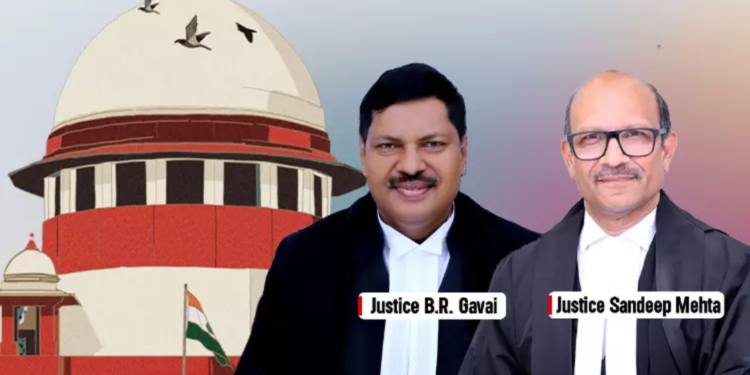In a recent judgment, the Supreme Court held that a charge of bigamy under Section 494 of the Indian Penal Code can only be framed against the spouse involved in the second marriage.
The Court emphasized that merely attending the second marriage does not imply that friends and relatives share the common intention to commit bigamy. The complainant must prima facie demonstrate an overt act or omission by the accused individuals and prove that they were aware of the existing marriage.
Key Points of the Judgment:
1. The Decision: The bench of Justices BR Gavai and Sandeep Mehta set aside criminal proceedings against the friends and relatives of the accused wife. They noted, “A bare perusal of the penal provision would indicate that the order framing charge is erroneous on the face of the record because no person other than the spouse to the second marriage could have been charged for the offence punishable under Section 494 IPC simpliciter. However, this is a curable defect, and the charge can be altered at any stage as per the provisions of Section 216 CrPC.”
2. Common Intention: The Court clarified that to hold friends and relatives liable under Section 34 IPC (common intention) for bigamy, the complainant must prove their presence, their overt act or omission, and their knowledge of the subsisting marriage.
Case Background:
The complainant (Respondent No. 2) married the accused (wife) on April 16, 2007. The complainant alleged that on August 13, 2010, the wife married another man under the Special Marriage Act of 1954, despite her existing marriage.
The Judicial Magistrate First Class had directed framing charges against the friends and relatives of the accused wife under Section 494 IPC read with Section 34 IPC.
The appellants challenged this order, but both the Sessions Court and the High Court dismissed their petitions, leading them to appeal to the Supreme Court.
Supreme Court’s Findings:
The Supreme Court noted that only the spouse involved in the second marriage can be charged with bigamy under Section 494 IPC.
The complainant must demonstrate that the accused were not just present but also actively participated with knowledge of the existing marriage.
The pre-charge evidence did not indicate that the mother and brother of the accused wife were present at the second marriage.
There was no evidence to prove that the friends of the accused actively participated in the second marriage knowing the existing marriage.
Legal Precedents:
The Court referred to the case of Gopal Lal v. State of Rajasthan, which outlines the essential elements of bigamy: (1) a valid first marriage, (2) a second marriage while the first marriage is subsisting, and (3) necessary ceremonies required by personal law.
The Court also cited Chand Dhawan (Smt) v. Jawahar Lal and Others, stating that mere presence at the second marriage does not imply facilitating bigamy.
Conclusion:
The Supreme Court quashed the charges and trial proceedings against the friends and relatives of the accused, reinforcing that only the spouse involved in the second marriage can be charged under Section 494 IPC.

















